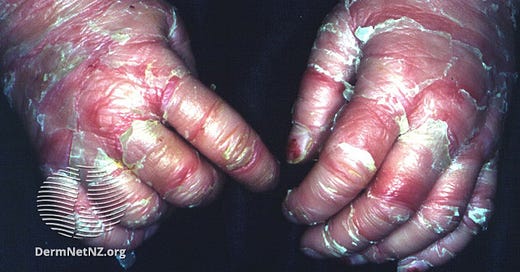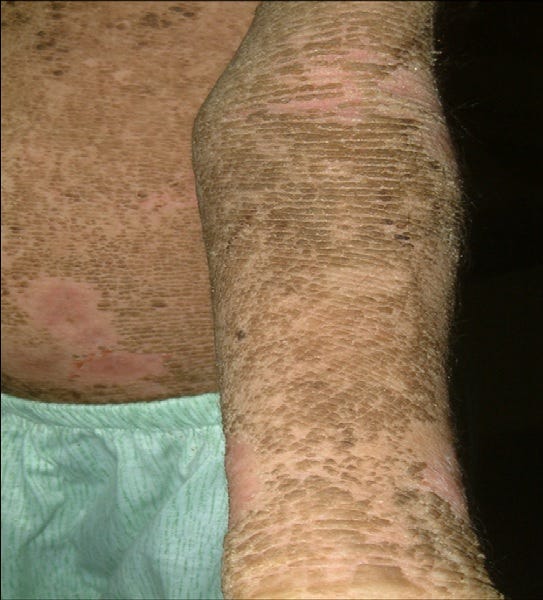Reality Check Woman - Origin Story, part 1
Superhero origin stories aren't just for Marvel heroes.
This is the first of a few posts related to who I am and how I became a zealous advocate for people with disabilities. I may expand on some of these topics and put those posts behind the paywall — I honestly haven’t decided yet.
Reality Check Woman
This is my (not so) secret superhero identity. Reality Check Woman (RCW) and Teri Adams look and dress alike. RCW pushes aside politeness and drops uncomfortable truths into the conversation. Hypocrisy and pretense are my activators and my Kryptonite.
Before RCW, there was Reality Check Girl—she got in trouble sometimes. In school, for being authentic before authenticity was in style.
They Didn’t See Me Coming
I have often thought that I was the weirdest thing that ever happened to my parents. They were both born and raised in the Pacific Northwest: Mom was from Portland, OR, and Dad was from Bellingham, WA. Conservative and traditional, not practicing any religion.
They met in Bellingham at Western Washington University (then a teachers’ college). My dad said that he let my mom pressure him into being an elementary school teacher. He always described himself as “not ambitious.” I don’t think he had a plan, so my mom gave him one. My mother started teaching on a unique teaching certificate during WWII; a child of the Depression, she saw teaching as a “secure” profession.
The story goes that they moved from Bellingham to California because my mother had seasonal affective disorder (SAD—they didn’t call it that then), so the rainy weather in Bellingham really had an impact on her. The truth is, as I experienced it, my mother had a lot of undiagnosed mental health issues, but this was one she would admit to.
They settled in San Mateo, California, in the Bay Area, and lived in the house they originally purchased for 66 years. (In 2021, they died in their home, as they wanted, a week apart.)
I came along in 1957, twelve years after they married—I don’t know what the story is about that. Surprise!
I was born with a rare skin disorder—epidermolytic ichthyosis (EI)—I think the doctors figured out it was a type of ichthyosis early on, but not which variant specifically for at least a decade. When I was little, the doctors told my parents I might outgrow it—I never believed that.
These are not my hands, but they look just like mine. This genetically caused skin disorder is all over my body, but it appears the worst on my hands and feet. When I was young, it looked much worse than it does today. Over time, the appearance has improved without any medical intervention.
In addition to the severe flaking seen in the first picture above, I had discolored patches of skin on my arms, legs, and neck and big callouses on my elbows and knees.
In the early 2000s, I had a young dermatologist question whether I had EI because I no longer have these prominent ridges on my arms, but I had them from birth into my thirties.
It is on my face, but if you only saw my face today, you wouldn’t think I had a severe skin disorder. When I was a child, I had patches of discolored skin on my face, but they are gone now; I do get a lot of flaking on my face. This picture was “touched up” by a friend, but she just covered up dry flaking. Layers of moisturizers can do a lot for my face now.
Quandary
(Quandary was one of my dad’s favorite words.)
I didn’t go to preschool, and I was surrounded by adults all the time. My skin was too fragile to run around and play. I started reading when I was around four. I had a big vocabulary for my age and was well-behaved (no running around.)
I started kindergarten when I was five years eleven months old. I am guessing that this was to “socialize” me with other kids. By this time, my parents had trained me to say, “I was born with this skin condition,” if anyone asked me about it.
Unfortunately, the kindergarten teacher told the kids I had a bad sunburn. I think it was Miss C’s first year teaching—I could tell she was scared of me/my skin. (I could always tell when adults were scared of my skin.) The kids avoided me. After a couple of weeks, they pulled me from the class; the school district sent a home teacher for a few weeks.
Enter the quandary part. I could read, and I could communicate well, but kids were scared of me because the teacher was afraid of me and lied about my disability. I have always thought that the kids would have gotten used to me if she had told the truth. Or, if I had been permitted to say, “I was born with skin like this,” the kids would have just accepted it.
Since it was my neighborhood school, I would have been with mostly the same kids from then on—it would have become no big deal. This is one of the first places where my life went sideways because of my disability and how others dealt with it.
As it played out, my parents had a “friend downtown,” a vice superintendent of their elementary school district, and he got me assigned to special ed. I was bussed from home to the “special” school for seven years.
I Rode the Short Bus
In the early 1960s, my county had a central school for special education, where children were bussed from all over the county. “Special ed” (special education) was a segregated educational program for students with various types of disabilities, primarily physical disabilities, some with cognitive issues as well. There were boys with muscular dystrophy, quite a few kids with cerebral palsy, spinal bifida, and one-offs like me.
Although my parents were both elementary school teachers, I don’t think they knew how different the special education program was from a “regular” school. I believe that a combination of shame, a desire to protect me, and a powerful desire not to rock the boat made this assignment special ed a good way out for them.
In special ed, kids just asked me, “What’s wrong with you?” and I would say I was born with this skin condition, and that was that. So, I was getting socialized. However, because I could read and write, I was quickly moved into the next older group of students from kindergarten (there weren’t grades in our school.) From then on, many of my friends have been five to ten years older than me.
Reality Check Woman - Origin Story, part 2 will follow soon.







Hi Teri, I wanted to comment earlier, but I needed to sit with your words for a bit and revisit them. My brother, just turned 60, has autism at the far end of the spectrum. He wasn't even accurately diagnosed until in his early 20's. He was educationally misplaced always. As a young child he e was in a program focused on functional life skills when his teachers discovered him reading. He learned on his own. Your story touches some deep feelings in me. I'm looking forward to reading more--because of our experiences with Joe, and also because I was an educator. So glad your work came up in my Notes feed.
Hi, Teri. I really hope you'll be continuing this story. I'm so invested already. x